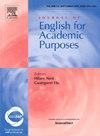Language matters in EMI: Language related episodes in nursing PBL classrooms
IF 3.4
1区 文学
Q1 EDUCATION & EDUCATIONAL RESEARCH
引用次数: 0
Abstract
This study investigates the occurrence of Language-Related Episodes (LREs) in English Medium Instruction (EMI) within Problem-Based Learning (PBL) sessions in a Nursing degree programme at a small-to-medium-sized university in Catalonia (Spain). EMI, which uses English as the medium for content instruction, reshapes pedagogical dynamics, often necessitating linguistic support, especially in sociolinguistic contexts like Spain, with low average English proficiency. Using an ethnographic approach, the study examines PBL tutors' and students' language practices from an emic perspective, analysing LREs that emerge during sessions. Five tutors (proficiency levels: B2 [n = 3], C1 [n = 2]) participated, and eight PBL sessions were observed and recorded.
Findings reveal that students, whose English proficiency ranged from A2 to C1, initiated over 70 % of LREs, reflecting their proactive engagement in seeking linguistic support. Vocabulary and code-switching were the most common focus areas, with a high resolution rate of LREs. Tutors played varied roles in addressing language challenges. C1-level tutors emerged as “language-aware” facilitators, engaging preemptively and reactively in LREs, providing corrective feedback, and leveraging code-switching to support disciplinary literacy. In contrast, “language-elusive” tutors tended to overlook students' linguistic needs. Despite tutors' self-identification as content-focused rather than language instructors, results indicate that their language awareness significantly influences students' development of disciplinary literacy. This research highlights the interplay between language proficiency, instructional support, and the expert role in EMI-PBL contexts, underscoring the importance of fostering language awareness in tutors to enhance EMI implementation.
语言对EMI的影响:护理PBL课堂中的语言相关事件
本研究调查了西班牙加泰罗尼亚一所中小型大学护理学位课程中基于问题的学习(PBL)课程中英语媒介教学(EMI)中语言相关事件(LREs)的发生情况。EMI使用英语作为内容教学的媒介,重塑了教学动态,通常需要语言支持,特别是在西班牙等平均英语熟练程度较低的社会语言学背景下。本研究采用民族志方法,从主题的角度考察了PBL导师和学生的语言实践,分析了课程期间出现的LREs。5名教师(熟练程度:B2 [n = 3], C1 [n = 2])参与,观察并记录8次PBL会话。调查结果显示,英语水平在A2到C1之间的学生发起了超过70%的lre,反映了他们积极主动地寻求语言支持。词汇和语码转换是最常见的重点领域,lre的分辨率很高。导师在应对语言挑战方面扮演着不同的角色。c1级导师成为“语言意识”的促进者,他们先发制人,积极参与LREs,提供纠正性反馈,并利用代码转换来支持学科素养。相比之下,“语言难以捉摸”的导师往往忽视了学生的语言需求。尽管导师自我认同为注重内容而非语言教师,但结果表明,他们的语言意识显著影响学生学科素养的发展。本研究强调了语言能力、教学支持和专家角色在EMI- pbl环境中的相互作用,强调了培养教师语言意识以提高EMI实施的重要性。
本文章由计算机程序翻译,如有差异,请以英文原文为准。
求助全文
约1分钟内获得全文
求助全文
来源期刊

Journal of English for Academic Purposes
Multiple-
CiteScore
6.60
自引率
13.30%
发文量
81
审稿时长
57 days
期刊介绍:
The Journal of English for Academic Purposes provides a forum for the dissemination of information and views which enables practitioners of and researchers in EAP to keep current with developments in their field and to contribute to its continued updating. JEAP publishes articles, book reviews, conference reports, and academic exchanges in the linguistic, sociolinguistic and psycholinguistic description of English as it occurs in the contexts of academic study and scholarly exchange itself.
 求助内容:
求助内容: 应助结果提醒方式:
应助结果提醒方式:


